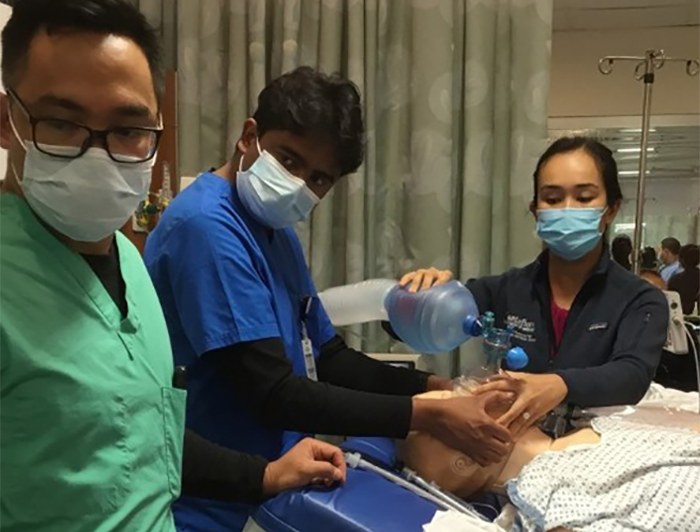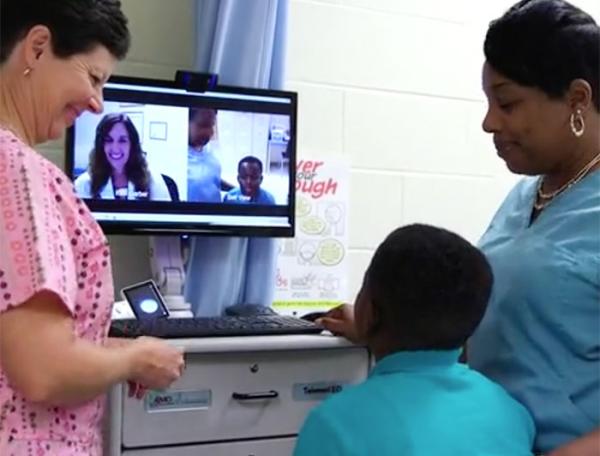

Protect Access to Care for Patients and Communities
Patients and communities rely on the wide range of critical health care services that only hospitals and health systems can provide, including 24/7 emergency and other higher-acuity care. Hospitals also work with their community partners to develop and deploy programs that advance health and wellness. See examples of programs from hospitals across the country.
However, access to care and services are being jeopardized by the unprecedented challenges hospitals are facing, including workforce shortages, soaring costs of providing care, government payers continuing to pay below the cost of care, and commercial insurers erecting barriers to care and payment.
Congress should enact policies to strengthen the health care workforce and reject harmful proposals that would cut Medicare or Medicaid payments to hospitals and reduce access to care and services for patients.
Site-neutral Payment Proposals
Hospitals and their associated facilities provide access to critical services that are not otherwise always available in the community and they treat patients with very severe conditions. Payment proposals that attempt to treat hospital outpatient departments the same as independent physician offices and other ambulatory sites of care ignore the very different level of care provided by hospitals and the needs of the patients and communities cared for in that setting. Hospitals need to have emergency stand-by capacity, are open 24/7 to all who seek care regardless of ability to pay, and have myriad regulatory requirements imposed on them – all adding to the overall cost of care.
AHA Position
Congress should oppose site-neutral payment cuts, which would reduce access to critical health care services, especially in rural and other underserved communities.
Key Resources
- Op-Ed: Rick Pollack, The Hill, “Proposed Medicare cuts jeopardize access to care for patients and communities”
- Infographic: Site-neutral Payment Policies Threaten Access to Hospital-level Care
- Proposals to Reduce Medicare Payments Would Jeopardize Access to Essential Care and Services for Patients
- Infographic: Setting the Record Straight: Private Equity and Health Insurers Acquire More Physicians than Hospitals
- Infographic: How Site-neutral Payment Policies Threaten Access to Hospital-level Care
- Fact Sheet: Medicare Site-neutral Legislative Proposals Would Jeopardize Access to Care
- Fact Sheet: Medicare Hospital Outpatient Site-Neutral Payment Policies
- Study: Comparison of Medicare Beneficiary Characteristics Between Hospital Outpatient Departments and Other Ambulatory Care Settings (KNG Health Consulting LLC, on behalf of the AHA)
340B Drug Pricing Program
The 340B program has worked successfully for over 30 years to allow eligible providers to stretch limited federal resources to provide more comprehensive programs and services to more patients. This is exactly what Congress intended when it created the program in 1992.
AHA Position
Congress should protect the 340B program for all providers and ensure the program continues to help providers stretch limited resources and provide more comprehensive services to more patients. In addition, Congress should advocate that the Department of Health and Human Services remedy all affected hospitals for the unlawful Medicare payment cuts without clawing back funds from any hospital or health system. Congress also should expand drug manufacturer transparency and thwart drug manufacturers’ efforts to unilaterally and unlawfully change the 340B program.
Key Resources
- Fact Sheet
- Survey Brief: Drug Companies Reduce Patients’ Access to Care by Limiting 340B Community Pharmacies | AHA
- Talking Points — Ensuring the Protection of the Vital 340B Program for Patients and Providers
Price Transparency
Hospitals and health systems are committed to empowering patients and their families with all the information they need to live their healthiest lives. This includes ensuring they have access to accurate and timely price information when seeking care. Hospitals and health systems have made important progress in adopting federal price transparency requirements that require they both publicly post machine-readable files of a wide range of rate information and provide more consumer-friendly displays of pricing information for at least 300 shoppable services.
AHA Position
The AHA supports price transparency efforts that help patients access clear, accurate cost estimates when preparing for hospital care. The AHA also supports aligning federal price transparency requirements to avoid patient confusion and duplication of effort that adds unnecessary cost and burden to the health care system. Despite hospitals’ increasingly successful efforts to provide transparency to patients, third parties continue to issue reports mischaracterizing compliance with the Hospital Price Transparency Rule.
Key Resources
- Fact Sheet
- Explainer Video
- Statement for the Record for March 2023 Energy and Commerce Health Subcommittee Hearing
Physician-owned Hospitals
Some members of Congress continue to propose weakening Medicare’s prohibition on physician self-referral to new physician-owned hospitals and loosening restrictions on the growth of grandfathered hospitals. Legislation has been introduced that would allow problematic physician-owned hospitals to open and permit unfettered growth in existing physician-owned hospitals.
AHA Position
Congress should maintain current law; preserve the ban on physician self-referrals to new physician-owned hospitals; and retain restrictions on the growth of existing physician-owned hospitals.
Key Resources
- Fact Sheet
- 2023 Study on Physician-owned Hospitals Compared to Community Hospitals
- AHA/FAH Letter to Hill on Proposed Legislation
Medicaid DSH Payment Cuts
The Medicaid Disproportionate Share Hospital (DSH) program provides essential financial assistance to hospitals that care for our nation’s most vulnerable populations — children, impoverished, disabled and elderly. Medicaid DSH payment reductions are scheduled to be implemented on Oct. 1, 2023 when $8 billion in reductions take effect.
AHA Position
Congress should provide relief from the Medicaid DSH cuts in fiscal year (FY) 2024 given the vital need for the program.
Key Resources



